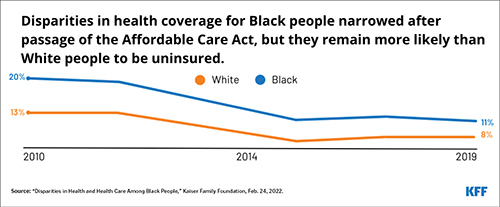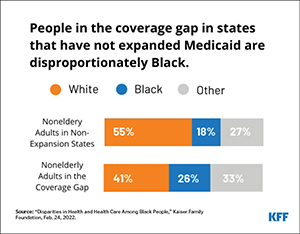Almost 20 years after the release of a national study he collaborated on showed that racism contributes to disparities in health care, Brian Smedley says little has changed.

Smedley was the lead editor of "Unequal Treatment: Confronting Racial and Ethnic Disparities in Health Care," a study produced by the Institute of Medicine (now the National Academy of Medicine) in 2003 at the request of Congress. It found that racial and ethnic minorities experienced higher rates of morbidity and related mortality.
The study stated: "The reasons for these health status disparities are complex and poorly understood, but may largely reflect socioeconomic differences, differences in health-related risk factors, environmental degradation, and direct and indirect consequences of discrimination." The authors offered several suggestions for follow-up studies to figure out how to address the inequities.

The report prompted headlines and calls for action that Smedley says have largely gone unheeded.
"Despite all of the attention directed toward the 'Unequal Treatment' report, despite the many recommendations that were offered in that report, we as a nation have not made significant progress toward eliminating these health care disparities and unfortunately for many patients, this is a matter of life and death," says Smedley, who is now an equity scholar with the Urban Institute.
He reviewed the study's findings during a webinar Feb. 23 sponsored by the Center for Health Journalism at the University of Southern California. He is co-writing a book following up on the study called "Unequal Health: Anti-Black Racism and the Threat to American Health" that is set for release later this year.

Smedley discussed more recent research that shows the disparities cited in "Unequal Treatment" persist. Among them is the annual report on disparities and quality produced by the Agency for Healthcare Research and Quality, a federal agency within the Department of Health and Human Services.
The agency said of the findings in its 2021 report: "While Black, Hispanic, American Indian, and Alaska Native communities have experienced substantial improvements in health care quality, significant disparities in all domains of health care quality persist. Even when rates of improvement in quality exceeded those experienced by white Americans, the improvements have not been enough to eliminate disparities."
The forces behind the disparities are many, according to Smedley. They include separate and inequitable health care systems, with those serving largely communities of color often lacking specialty providers and the latest medical technology. A second factor in disparities is variations in health insurance, including in covered services and reimbursements.
Another key factor he cited is physician bias that includes racial stereotyping. He mentioned a 2016 study that showed more than 70% of white medical students believe there are biological differences in pain perceptions between Blacks and whites. The study found that such beliefs could be at the root of disparities in the provision of pain medications.
Also at play in health care inequities, Smedley said, is the lack of diversity among health care professionals. He noted that racial concordance between care providers and patients has been shown to improve health outcomes. He cited a study from 2020 that looked at 1.8 million hospital births in Florida from 1992 to 2015. It found that when Black doctors did the delivery, the mortality rate for Black babies was halved.
Smedley said that while health care disparities affect the health and life spans of minorities, they take a toll on the nation overall. Not providing preventive care and early interventions for a significant part of the population, for example, means those patients are likely to need more expensive care later, which drives up medical costs for everyone.
The strongest argument for addressing care disparities in Smedley's view is basic fairness. "We as a society have a moral imperative to ensure that health care is equitable for every patient according to patient need," he said. "Widespread disparities
should not exist and in fact are antithetical to our beliefs as a nation in terms of our egalitarian ideals."
